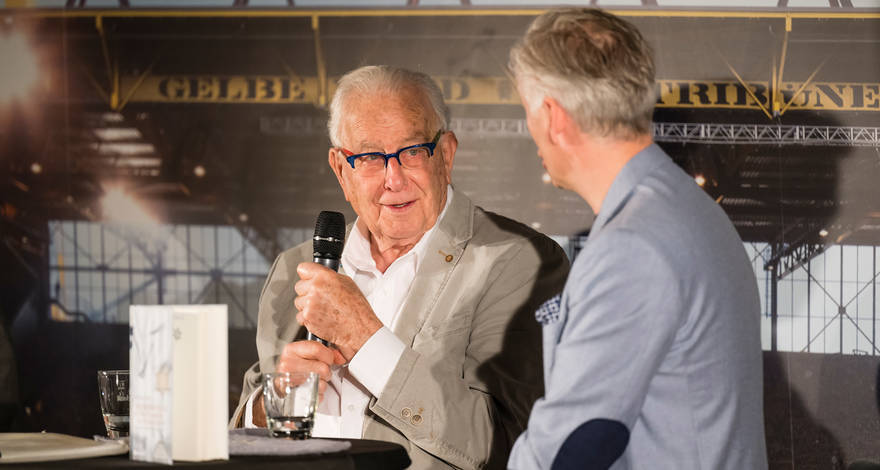To mark the 78th anniversary of the liberation of the Buchenwald concentration camp, a conversation with Holocaust survivor Naftali Fürst was held at SIGNAL IDUNA PARK on Tuesday night. The 90-year-old spoke about his experience as a young boy in the Auschwitz and Buchenwald concentration camps.
”I share the experiences of my childhood, so that what happened back then won’t be forgotten. All those who meet me will pass on what I tell them – and that’s important. It’s nice to see that so many young people could be here with us today,” – these were the moving words spoken by Holocaust survivor Naftali Fürst on a poignant evening at SIGNAL IDUNA PARK.
After introductory words by BVB president Dr. Reinhold Lunow, the 300 guests in attendance watched a 20-minute film in which Naftali Fürst shared his experience of the Auschwitz and Buchenwald concentration camps. Fürst, who was nine years old when he first entered a concentration camp, gave insights into his childhood and spoke about deportations, the journey to the concentration camps and his liberation.
Afterwards, he took a seat on the podium for the eyewitness discussion, where he was joined by Thomas Schmid and Martin Kranz. Schmid is the chairman of the Thuringia fan club association of Borussia Dortmund. The association comprises 23 fan clubs with over 1,000 active members. The association was founded ten years ago and since then has been campaigning, among other things, against all forms of anti-Semitism. Martin Kranz is the artistic director of the ACHAVA Festival Thuringia. He moderated the conversation with Naftali Fürst throughout the evening.
The historical witness, who was born in 1932, spoke first about his childhood and his family’s initial incarceration in the labour camp in Sered. From there, they were deported to Auschwitz-Birkenau in November 1944. Fürst and his brother were separated from their parents. ”Today I have children, grandchildren and great-grandchildren. I can’t imagine what thoughts must have been going through my mother’s head back then. We didn’t think we would ever see each other again,” said the 90-year-old.
His descendants were there in the audience on Tuesday evening. Four generations accompanied their father, grandfather and great-grandfather in Dortmund. On Saturday, they were guests of honour at the match against Union Berlin, and were greeted at the BORUSSEUM with warm words from BVB managing director Carsten Cramer.
Fürst spoke about the terrible conditions in Auschwitz-Birkenau; his everyday life was characterised by self-doubt: “I thought to myself: what have I done that is so terrible? Why do I have to go through all this? I lost all faith in God.”
But the worst was yet to come for Fürst and his brother. Innumerable prisoners were forced to embark on the death march from the concentration camp in Auschwitz-Birkenau to Buchenwald. His recollections are striking: “You can’t imagine it. I saw so many dead people and suffering on the way. All those who couldn’t keep going, who lay from exhaustion, were just shot straight away.” In temperatures as low as -25 degrees and metres of driving snow, the prisoners had to cover 150km on foot in four days. “We didn’t have any hope and we were tired. It was torture, we had nothing to eat, nothing to drink. Nevertheless, we had to keep going somehow,” Fürst recalls.
During the almost 90-minute conversation, the 300 guests in attendance listened intently to the stories told by the survivor. Once they arrived at Buchenwald, Fürst – who now lives in Israel – and his brother were led to Block 66. This was a children’s unit in which about 900 children were held.
Due to the hardships experienced during deportation to Buchenwald, Fürst was seriously ill when he arrived. “I had a high fever and a severe cold.” For reasons unknown to him, some of the sick were taken to the Buchenwald camp brothel. “Because I was a nice boy, the women spoiled me and gave me bread and chocolate,” Fürst recalls with a smile. There he was taken care of by a doctor.
Still lying in the sickbed of the camp brothel, Naftali Fürst and the other prisoners were liberated on 11 April 1945. “11 April is my second birthday,” said the Shoah survivor to the audience in Dortmund on Tuesday evening. After the end of the war, he returned home where, to his surprise, he was reunited with his brother and parents. It emerged that they were the only family of Holocaust victims from Slovakia in which both parents and children survived.
BVB President Dr Reinhold Lunow was deeply moved: “Words cannot do this justice, it was a very poignant evening. We can only marvel at the way Mr. Fürst deals with what happened to him, and his efforts to make young people aware of this history.”
“Like pieces of coal in the flames of terror – a family survives the Holocaust” – this is the title of the book in which Naftali Fürst and his brother Shmuel tell their story. Many attendees picked up a copy of the book on Tuesday evening and had it signed by the author himself at the end of the event.
A school class also visited SIGNAL IDUNA PARK – despite the Easter holidays. One of the children approached the Holocaust survivor after the event and asked him: “What does happiness mean to you?” Fürst answered: “Happiness for me is that I am allowed to live. I am here with my family, there are four generations of us. That is happiness.”

